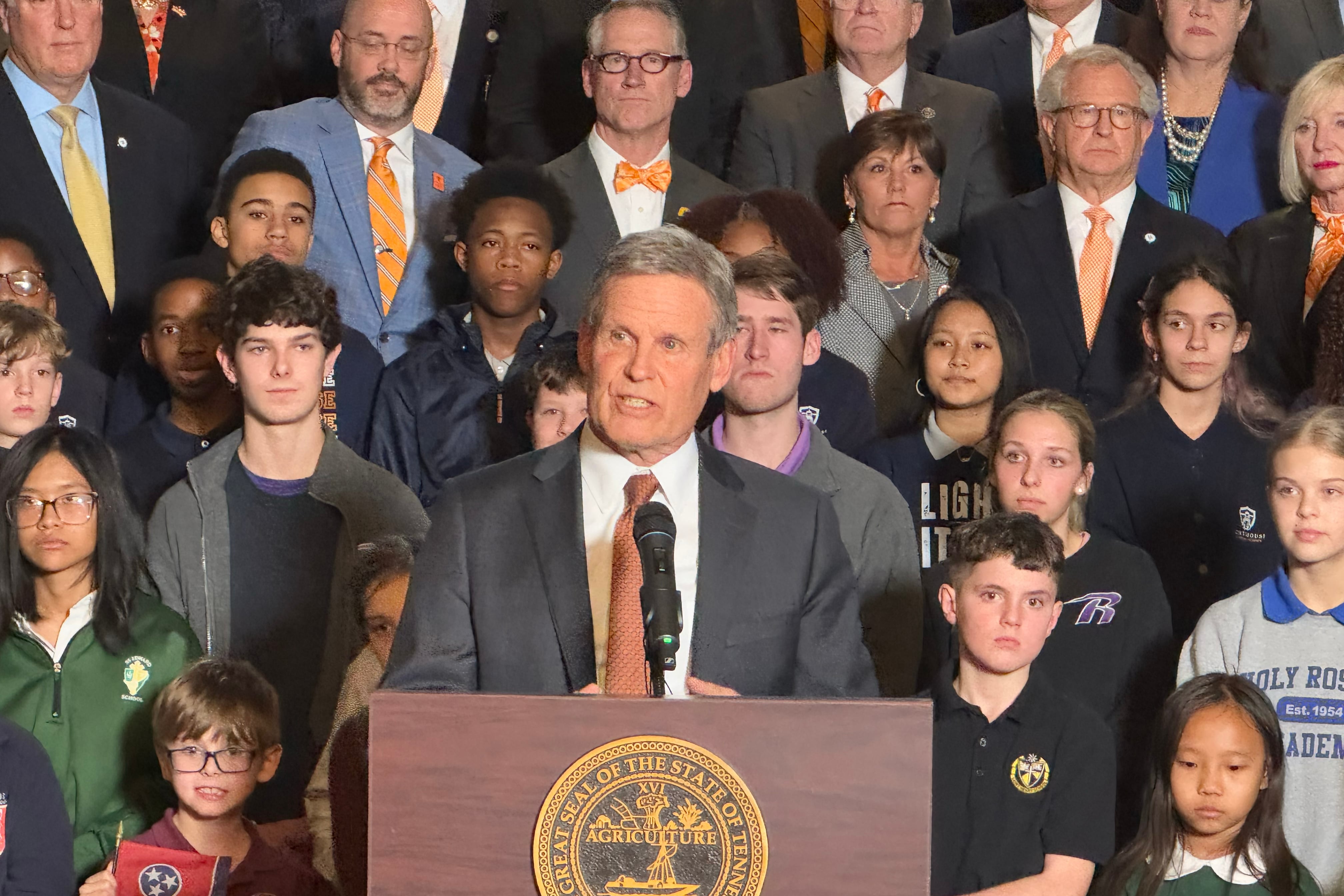Sign up for Chalkbeat Tennessee’s free newsletter to keep up with statewide education policy and Memphis-Shelby County Schools.
Gov. Bill Lee signed Tennessee’s universal school voucher bill into law Wednesday, officially kicking off the state’s push to roll out the program this year for up to 20,000 students.
With only about six months until the new school year, the state has a lot to do before eligible families can receive taxpayer funding to send their children to private schools.
The state Board of Education must develop and approve rules for Lee’s Education Freedom Scholarship Program. For instance, how can families appeal if the state denies them a voucher?
Tennessee’s education department will have to staff up — a projected 11 new positions — to oversee the program.
And perhaps most pressing, Lee’s administration must decide whether to seek a new vendor to automate application and payment processes for the statewide program, or use its current vendor, Indiana-based Student First Technologies, which manages the state’s two existing smaller school voucher programs.
Because the state’s 2023 contract with Student First requires the company to accommodate at least 20,000 users, the legislature’s financial analysts assumed the state would use Student First for the statewide program too.
But Lee said Wednesday that no decision has been made about a vendor, and he wouldn’t commit to ensuring that the state education department seeks competitive bids if it decides to pursue a new company.
“I’ll defer to the department on the procurement process,” he told reporters after signing the bill.
Last month, after the voucher bill passed during a special legislative session, the governor’s spokeswoman said the state was exploring its options.
“While we have had success with Student First Technologies, … our team has met with a number of experienced vendors to learn how other states have implemented universal school choice programs successfully,” said Elizabeth L. Johnson, Lee’s press secretary.
Tennessee bypassed the market leader when choosing its first voucher vendor
In 2023, Tennessee raised eyebrows by signing a $3.675 million, five-year contract with Student First, a young company with a small staff, modest cash flow, and no state-level experience managing education savings accounts.
The contract was signed after a competitive bid process, and after the state failed to reach terms with Florida-based ClassWallet, Tennessee’s first choice to run its education savings account program for Davidson, Hamilton, and Shelby counties, as well as a smaller voucher program for students with disabilities. Within a year, Student First launched its electronic platforms in Tennessee.
But several other states using Student First say the company has not kept up with demand as private school voucher programs have expanded nationally.
Last fall, Arkansas terminated its Student First contract after the company failed to meet deadlines and created faulty platforms, according to that state’s education department.
In West Virginia, which awarded Student First a $10 million contract to manage purchases and payments for its education savings accounts, the system struggled to keep up as enrollment climbed.
Tennessee’s education department has not fulfilled Chalkbeat’s public records request, submitted last June, to inspect correspondence and other documents that would show how Student First platforms have performed, including the thousands of transactions that the company manages on behalf of the state with ESA participants.
Mark Duran, the company’s founder and chief executive officer, did not respond Wednesday to Chalkbeat’s request for comment.
Meanwhile, other companies in the school-choice marketplace are interested in pursuing a new contract for Tennessee’s statewide program, including ClassWallet, which scored highest in the 2023 competitive bid process and currently has voucher contracts with 12 states.
“ClassWallet would welcome the opportunity to bring our mission to Tennessee and maximize the impact of school choice for families and students there,” Jamie Rosenberg, the company’s founder and CEO, told Chalkbeat.
He added that ClassWallet has experience and capacity to launch a state-level education savings account program in a matter of weeks.
“Families tell states that our software is straightforward and easy to use,” he said Wednesday.
Governor is confident of a 2025 launch
Voucher opponents criticized Lee for including his proposal in a special legislative session in late January that also addressed disaster aid and immigration policies. But Lee argued that passage in early 2025 would be necessary to launch the voucher program in time for the upcoming school year.

After signing the bill Wednesday, Lee said he told Education Commissioner Lizzette Reynolds to “get started on implementation.”
He wouldn’t speak about the details of a rollout, but said he’s confident of a 2025 launch.
“You’ve got to remember, we already have an education savings account plan in place in this state for our three largest school districts, so we have some expertise within the department in how to implement this plan,” Lee told reporters.
While no timeline was immediately available, the department will have to open the application window soon to determine which private schools will participate. Then comes the application window for families who want access to the vouchers, which provide about $7,200 toward the cost of private education services.
“We will partner with the State Board of Education as they promulgate rules and are collaborating with the state’s Central Procurement Office to explore all options to implement the program in compliance with state procurement laws and rules,” said department spokesman Brian Blackley.
Also at issue: How will the state confirm legal residency for participating students?
While the initiative is touted as a “universal” program for anyone in Tennessee — the family income limits disappear after the first year — Republican leaders included a provision in the law saying the state education department “shall deny” any school voucher application from families that “cannot establish the eligible student’s lawful presence in the United States.”
The provision appears to conflict with a 1982 U.S. Supreme Court ruling that requires states to offer public education programs to all children, regardless of their immigration status. The Tennessee program pays for private-school education, but it uses public funds.
“What’s most important to know,” Lee told reporters, “is that this language doesn’t change anything about the state’s obligation as it currently stands to educate children.
“But for this scholarship,” he added, “it’s only available to Tennessee citizens.”
Marta Aldrich is a senior correspondent and covers the statehouse for Chalkbeat Tennessee. Contact her at maldrich@chalkbeat.org.






